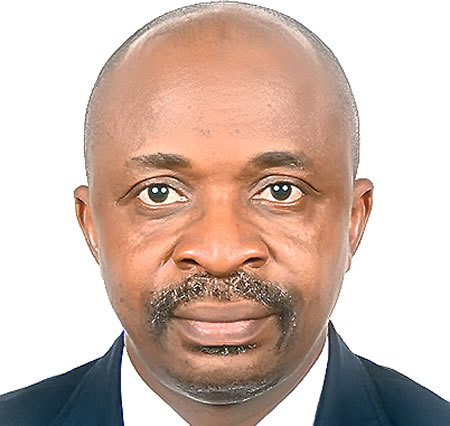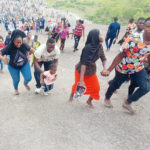How would you describe your growing up, formal education and career?
I was born in Agurooo, Osun State. That’s where I attended Baptist Primary School. Thereafter, I spent a year at Local Authority Modern School, Ejigbo before I gained admission to Baptist Secondary Grammar School, Ola-Ejigbo. Apart from attending school, we were exposed to practical farming. We were very close to nature. As a small boy, I could tell the sound a squirrel makes. I could tell which bird made what sound. We enjoyed catching and frying crickets. We could make cocoa beds, tobacco beds, then plant, nurture the plants, harvest them and prepare them for the market. Broom making, basket making, crop production (maize, yam, vegetables, pepper and tomatoes) were part of elementary and secondary education.
After secondary school, I proceeded to Saint Andrew’s College of Education, Oyo, where I studied Education, English and History. I taught at Baptist Secondary Grammar School, Ola, and Divisional Teachers’ College, Ejigbo for about two years before moving to the Obafemi Awolowo University, Ile-Ife where I studied Education and English. After a year of youth service, I taught briefly in a school in Lagos before moving to Mayflower (Junior) School, Ikenne, where I actually cut my teaching teeth under the late Madam Sheila Solarin.
Give us your background as an administrator with Baptist educational institutions.
I was the Head of the English Department for about eight years at Mayflower. I left to head a new primary school, then I became principal of a new secondary school in Sagamu before I moved to Straitgate College, Isara-Remo (a Christian school). While I was in the classroom, I was an examiner and I rose to become a Team Leader for the West African Examinations Council. I was exposed to the teaching of WAEC, NECO and Cambridge (IGCSE) programmes.
Before I left Mayflower, I had acquired a Master’s Degree with which I taught on Part Time at Babcock University, Ilishan-Remo and the National Open University, Nigeria. I moved to Ibadan in 2011 to become the principal of Oritamefa Baptist Model School (OBMS), Total Garden, Ibadan. Before I resumed, I had been on a PhD programme. To the glory of God, the intimidating academic results of OBMS kept improving while I was there. In addition, I was able to defend my PhD thesis two years ago. Specifically in September 2017, God relocated me from OBMS to the office of Director, Baptist Mission Schools, owned by the Nigerian Baptist Convention, Ibadan.
Baptist education is known for its unique standards and best practices. What’s the secret?
Deuteronomy 29:29 says: “The secret things belong to unto the Lord our God, but those things which are revealed belong unto us and to our children forever, that we may do all the words of this law.” One may refer to Baptist people as “people of the book.” One may say they are organised, disciplined, hard working and experienced in running schools, but God is the secret. The gospel of Jesus Christ comes with the spirit of excellence that is associated with God. So, we do not joke with the God factor. Ist Corinthians 3: 6 to 7 corroborates it: “I have planted, Apollos watered; but God gave the increase. So then neither is he that planteth anything, neither he that watereth; but God that giveth the increase.”
Some of our students had A1 in 9, 8 and 7 subjects in the WAEC exams. Some scored 300 in the UTME 2017 and 2018. Those are results most parents today never had. God is good.
There have been concerns about Nigeria’s seemingly falling standards as it relates to the education sector. What lessons can Nigeria learn from the Nigerian Baptist Convention?
Seemingly, that is the word, not actually because this is debatable, I think. Times are changing; technology is advancing; information is ubiquitous. What standards are we talking about? Spoken English? Written English? WASSCE and JAMB results? Performance at work? Which work? The reality is that information is more available than ever, but reading of quality materials has apparently gone down. Reading is done mainly for exams. Extensive reading is virtually non-existent. Libraries hardly open where they exist at all and as parents will agree, many students appear to be lazy. Maturity has fallen. Focus has fallen. Many students are interested in games and social media.
However, WAEC and UTME questions are still standard. Some students still perform excellently well. I think solid education boards, discipline, well trained teachers, active inspection, active PTA, zero tolerance for exam malpractices and good staff welfare are some of the values that Nigeria education system can learn from the Nigerian Baptist Convention.
Do you believe that with the right variables in place, Nigeria can, in the nearest future, be the best in global education standards? Why do you think so?
I do, absolutely. Where the right variables exist, Nigerians are leading already. In recent time, names of Nigerians emerging the best or breaking records in Europe and America have appeared in the media. Many private schools in Nigeria have what it takes to compete with the best schools globally. Such schools have a clear vision, strong board of governors, carefully selected faculty, students with sound elementary school background, quality facilities, 21st century compliant curriculum, good welfare package for staff, zero tolerance for exam malpractice, among others.
The Nigerian Baptist Convention has schools in the North. With your experience, what ways would you suggest to ensure that the Chibok and Dapchi examples do not repeat themselves?
How do our leaders protect themselves from being kidnapped? Why can’t they protect all the citizens the way they protect themselves? An American citizen is seen as an asset to America. Our leaders should place a better value on the life of a Nigerian. Our security architecture and intelligence must improve. At present, we are too careless. All stakeholders in education should wake up. I rest my case; but before I do, let me add that our leaders should play less politics but think and engage our youths in productive ventures. An idle hand is the devil’s workshop.
If the Nigerian education system could fall under the Nigerian Baptist Convention, what would you do differently?
For starters, I would ask for 27% of the budget for education, as stipulated by UNESCO. Teacher training and welfare will improve to attract excellent students to teaching. Automatic employment and automatic promotion for staff and students will stop. Every primary school will have primary six. Teacher training colleges will be established to train primary school teachers properly. There will be scholarships right from the primary schools. Every primary/secondary school will have functional library. Technical colleges and polytechnics will be better managed and funded. I will deploy technology fully into education to encourage practical teaching and learning. Nigerian Baptist Convention schools are heading in the direction of best practices that exist in Finland, Singapore and South Korea.
Students spend appreciable number of hours in school-related activities. What ways could parents/guardians support to give the best to their children/wards?
Parents should support the school to instil discipline at home and in school. Children turn out well where school and home collaborate to show the right way. Parents should be available to set standard, to provide balanced diet and care. Parents should be close enough to monitor their children’s exposure to the internet, pay visit to the school, encourage their children and be part of PTA meetings.
School fees and levies must be paid promptly. Parents must set good example, check to ensure notes and textbooks are in place, complain without delay, be positive and pray for (not curse) the children.






